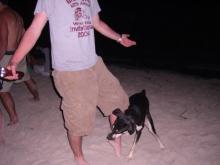
Airborne illnesses such as tuberculosis (TB) and flu:
Avoid crowded, enclosed spaces where people are coughing, if possible.
Wash your hands often and take along hand wipes for times when water is unavailable.
Flu vaccination is recommended for travelers annually and those who at risk at their destination. See Influenza on the CDC website.
TB testing may be recommended under certain circumstances. See also Tuberculosis and Testing on the UHS website and Tuberculosis on the CDC website.
See also Novel Coronavirus (2019-nCoV).
Blood-borne illnesses, including HIV:
Before travel, take care of any medical or dental needs that require procedures involving injections, scalpels, and other invasive procedures to avoid contact with contaminated instruments or blood.
Don’t get tattoos, piercings, or acupuncture while traveling.
Meningococcal meningitis:
Vaccination is:
- Recommended for travelers to the "meningitis belt," a swath across Africa, from December to June -- see map and more at Meningococcal Disease on the CDC website
- Required for travelers to Saudi Arabia for the Hajj
Polio:
Make sure you are up-to-date with your routine polio vaccination series. In addition, a one-time adult polio vaccine booster dose is recommended for travelers to certain countries. Some countries require documentation of vaccination.
Sexually transmitted infections, including HIV:
Bring and use condoms from home if you anticipate being sexually active.
Hepatitis B vaccination is recommended for travelers at risk; most students were vaccinated in childhood. See also Hepatitis B on the CDC website.
See also HIV Infection on the CDC website.
Rabies:
Don’t touch or feed animals (especially dogs and monkeys) you don’t know because they may carry rabies. Vaccination is available but does not eliminate the need for post-exposure treatment. Vaccination is recommended for travelers who will stay:
- More than 24 hours from a reliable source of post-exposure treatment
- More than 4 weeks in certain rural areas; vaccination does not eliminate the need for post-exposure treatment
See also Rabies on the CDC website.
Schistosomiasis:
See Map from the CDC (scroll down to see map) and note that SubSaharan Africa has the highest risk.
Schistosomiasis is a parasitic infection of the liver, intestines or urinary tract. It is transmitted by infected larvae in contaminated water.
Symptoms may include fever, loss of appetite, weight loss, abdominal pain, the presence of blood in urine, weakness, headache, joint and muscle pain, diarrhea, nausea, and cough.
To prevent schistosomiasis:
- Avoid wading, swimming, and bathing in bodies of fresh water, e.g. ponds, lakes, rivers
- Heat bathwater to 122° F (50° C) for 5 minutes or allow bathwater to stand for 2 days before using
For more information, see Schistosomiasis on the CDC website.
Tetanus:
Make sure your tetanus shot and other routine immunizations are up-to-date before travel.
